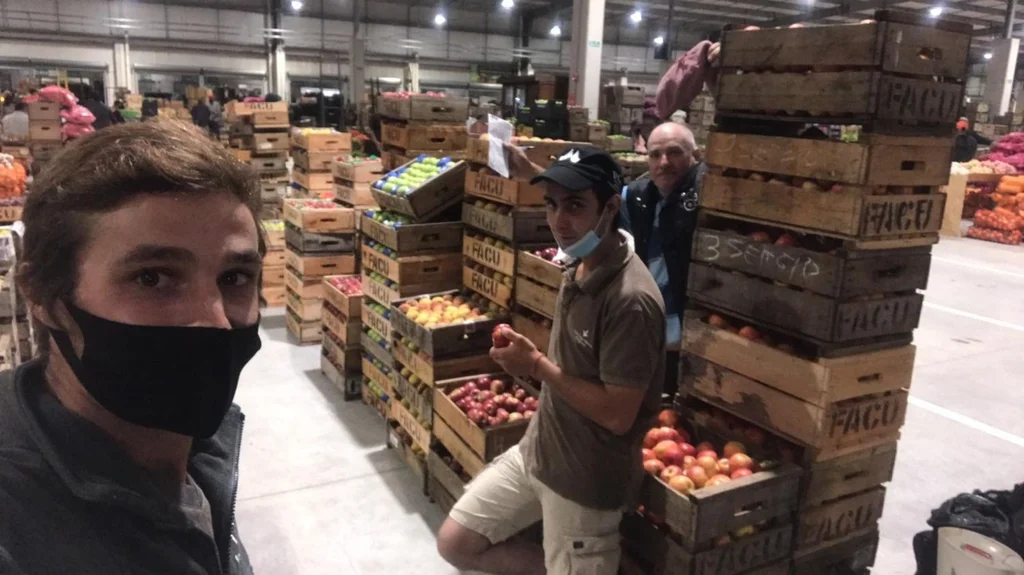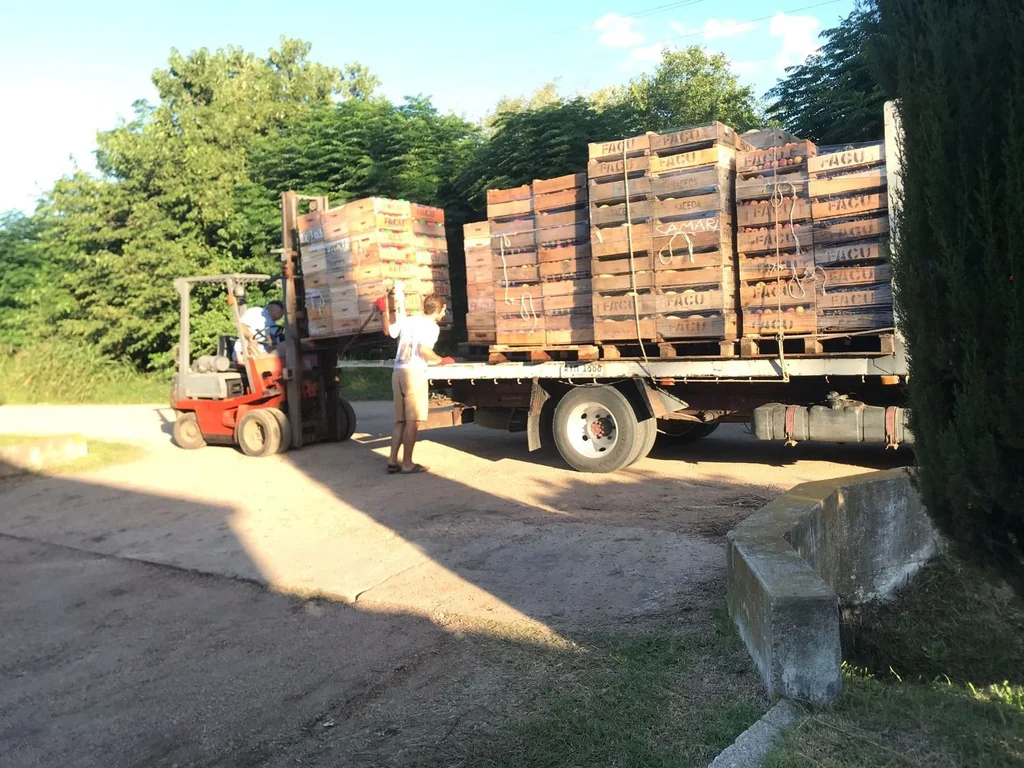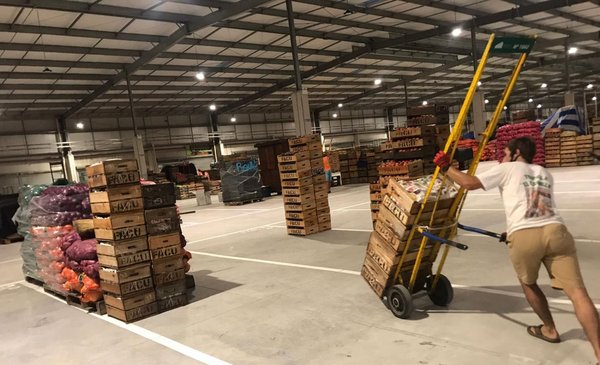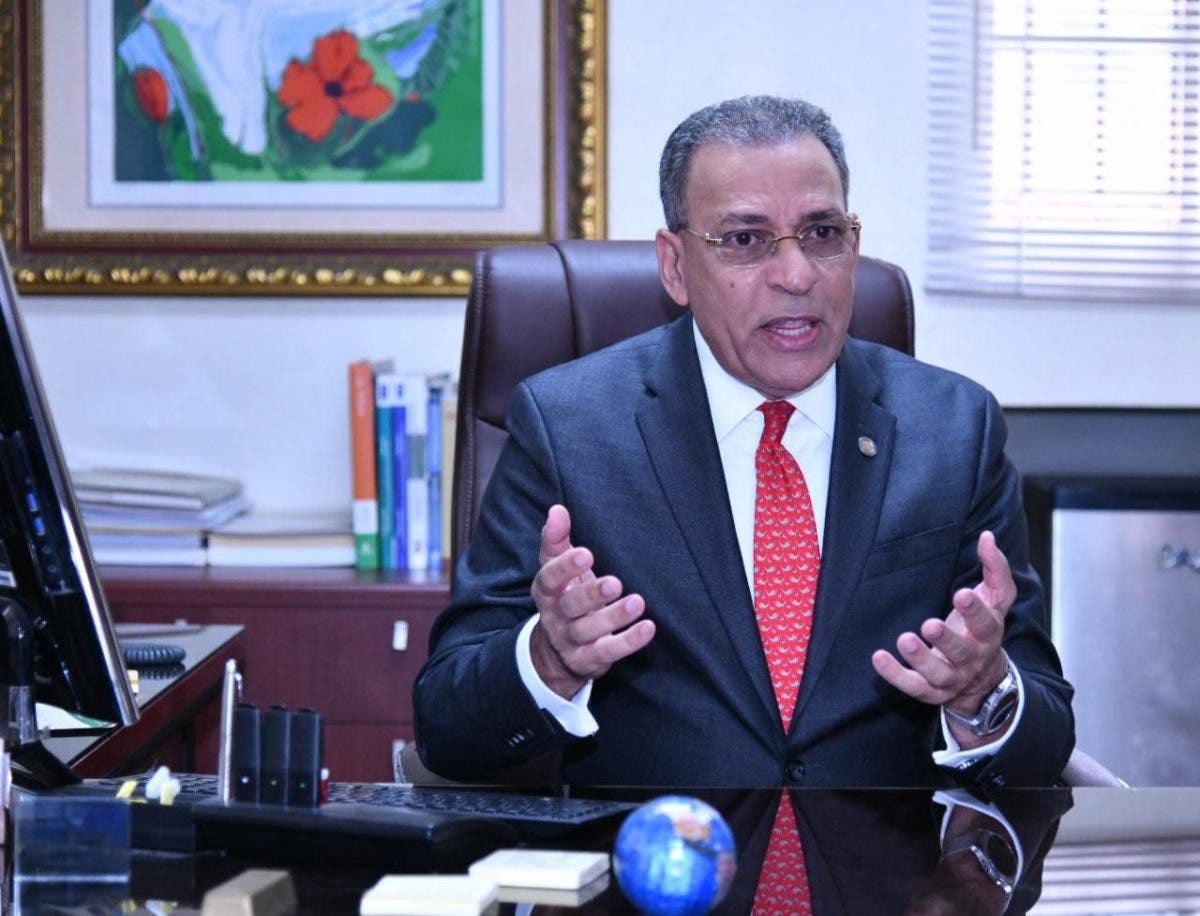Facundo Baceda is from Los Cerrillos –Canelones– and at the age of 26 he had to make a difficult decision, although he was not the only one: to stop working at the Metropolitan Agrifood Unit (UAM), where he sold fruit and vegetables, because the high costs did not allow him to achieve a profit margin.
Facundo began working in the fruit and vegetable sector at the age of 13, when he began accompanying his father, Marcelo, to the Mercado Modelo. Since he was a child he was linked to the countryside, his grandfather and his father were farmers. He also always liked horses and cattle very much. His father was an apple producer and also a commission agent – she bought produce from farmers to market it at a wholesale level. When Facundo turned 18, his father retired from the business and he was left in charge of the business where he sold apples, pears, lettuce, celery and parsley, among other farm products.
Once the move from the old market to the new premises, the one of the current UAM, was announced, the young man thought about it very well because he was not sure he wanted to go there to sell, he recognized The Observer.
“First I didn’t want to go because I thought it was too expensive, I was a little scared, (although) I agreed that it would be more expensive, because it was all new,” he said.
Finally he took a risk, did the math and moved, although when he arrived he had a surprise: the place for which he had to pay double what he paid at his old stall in the Mercado Modelo was smaller than the one he had in the old market.
Facundo and a producer from whom he bought merchandise to take to the UAM.
The UAM in two poles
When he started business in the new center he did very well. The first two months sold a lot, but then they started to go down. “At the beginning I worked beautifully, it was the harvest and it coincided that it was a good year (for the farm). But I knew winter was going to be rough for me. I endured a month of winter and said ‘it’s not enough,’ ”, she recalled.
His post was located in Ship Ein which several small and medium-sized operators were installed, where many left, as he learned The Observer.
For Facundo, at the UAM there were several realities that played against him. On the one hand, the high tariffs in a business where it is difficult to have margins to face them, on the other hand, the fact that the market “is very large” and “was divided into two poles”: in one sector the medium and small producers were located, and on the other On the other hand, during the harvest, the Salta merchants who are located mostly in warehouses A and B, generating a greater volume of commercialization with an impact on a lower sale for the rest.

Facundo began working at the Mercado Modelo with his father and then continued with the family business.
the difficult decision
Once business began to decline, Facundo, who already had a fruit and vegetable retail store in Los Cerrillos, began to think about what to do, whether or not to continue in the wholesale business. “I already saw things very complicated in the market, I was losing a lot of money for what I was driving, and I didn’t see a way out,” he said.
Together with her partner, Cecilia, with whom they run the La Yunta vegetable and seed store, they thought about what to do, and although the decision was made with a strong charge of emotions, because “it is a complicated issue, because I got a good deal of money to decide to leave” , the young man decided to leave his post at UAM.
“He was already very dedicated and bitter, but he had no way out. Lately it had gotten out of hand,” he recalled, and commented that he had to pay more than $28,000 a month in rent, so he had to sell more than $200,000 a month to be profitable, and sometimes he didn’t make it. .
It was four months that he worked at the UAM until he made the decision to leave. It wasn’t easy, he remembered. He had to notify the producers he bought from and the customers he sold to, he also had to get rid of some materials, such as the more than 1,500 boxes he had left – most of which he sold.
Other things, such as the truck, he continued to use, since He continues to go to the UAM, but now to buy and not to sell.
“They are capitals that are not so easy to leave when you set up a business like this and you project yourself. It is horrible to have to leave everything, but it was a risk that I already knew I was taking, ”she indicated.

After leaving the UAM, he had more than 1,500 boxes left, most of which he sold.
After leaving the market, he learned of other cases of colleagues who also had to leave due to high rates, something many operators are complaining about, and which is an issue that has been brought to the table in recent days, after the Ministry of Economy and Finance (MEF) will publish a audit showing various financial problems of the marketeven citing the risk of not being able to meet the UAM with financial obligations it has with Banco República.
“I know of people who are working very badly and who are tied to not being able to leave, because it is difficult to leave,” he said.
For him, it would be positive to have more unity between stallholders to be able to make claims when something does not work or is not to his liking. “I changed my field and did not fight for those who remained, but I would be willing and I am at your service. I think that it would be necessary to have more union to have more strength and to be able to claim. We would have to put a little bit of each,” he added.
He commented that an alternative, at least for small producers, is to lower – “by at least half” – the rental costs at the UAM, but that is something that must be evaluated very carefully, he said, “and I don’t know if it is something that the UAM will have evaluated”.
Farm and ranch
Facundo has also been farming for a year, something he likes a lot. In a field in Canelones he raises heifers, and although he started recently, he plans to continue with this activity because he believes it will go very well for him. He was able to get a piece of land and generate capital and he wants to stay in the business.
As to whether he would like to return to UAM, he said he would have to think about it. “The truth is that the UAM left me with a very bitter taste. Since I’m standing now, I wouldn’t go back, but suddenly things come up. If things improved I could think about it, because I like the business, because it is what I started to generate my first pesos with,” he said, and highlighted: “I am young, but the little I have worked in my life I have worked in the Mercado Modelo and at the UAM, and it’s not good that I had to get rid of what I had bought, because it changes your work profile and your mood”.
Although leaving UAM was hard on his spirit, he is well surrounded, he stressed, he had a lot of support from his family and friends. “It’s ugly because you break your back and work a very bad schedule, but I’m well surrounded and I’ve been able to overcome it,” he said.
A must that the Municipality of Montevideo has to solve
For Facundo, one of the big problems facing the UAM is that not all the fruit and vegetable merchandise that is sold wholesale in the capital passes through there. That is something that many market operators claim, given that unfair competition is generated.
Marcelo Moizo, market operator and member of the Executive Board of the UAM, told El Observador that this issue is viewed with great concern by the wholesalers who work in that market, given that those who sell abroad avoid all costs. linked to operating in the new market, for example rental rates.
As detailed by Moizo, it is the Municipality of Montevideo that must be in charge of controlling the so-called “exclusion zone” by which it was determined that wholesale sales of fruit and vegetables cannot be carried out within Montevideo in a place other than the UAM. “They said that the exclusion zone was going to be applied to the letter, and until today we will see,” he said.







